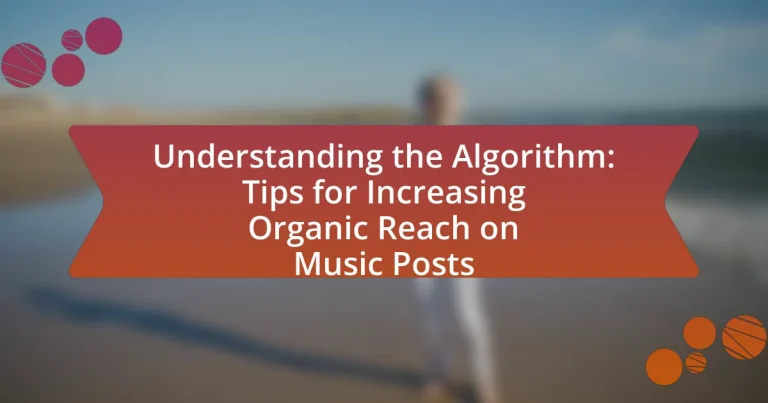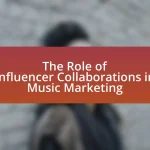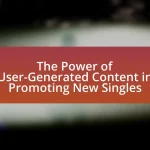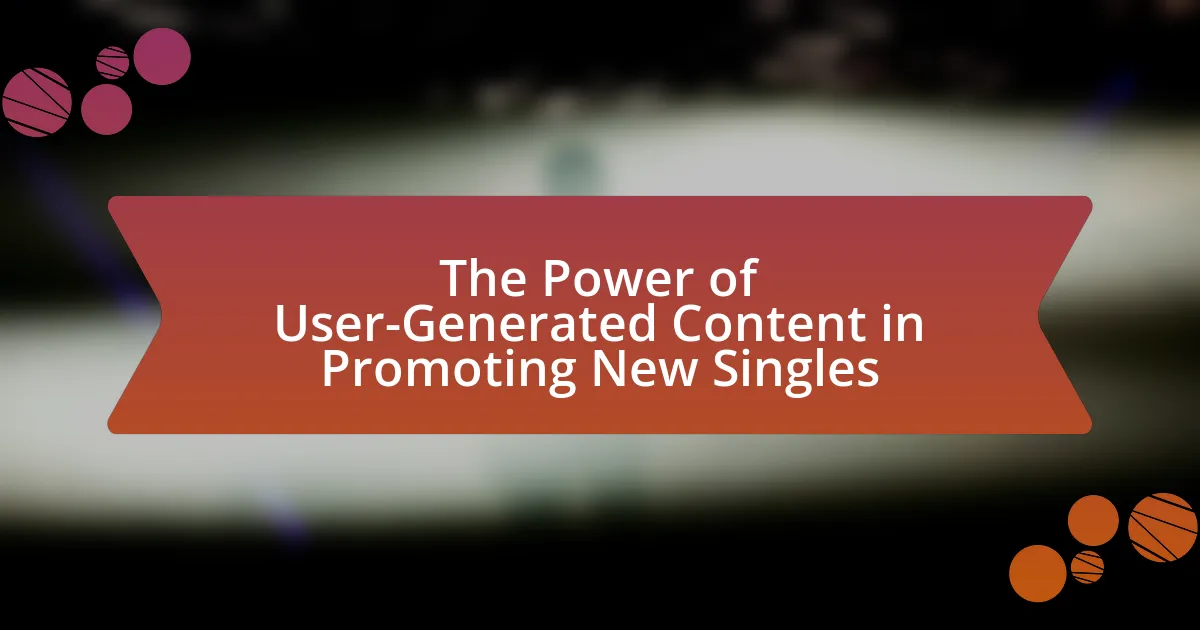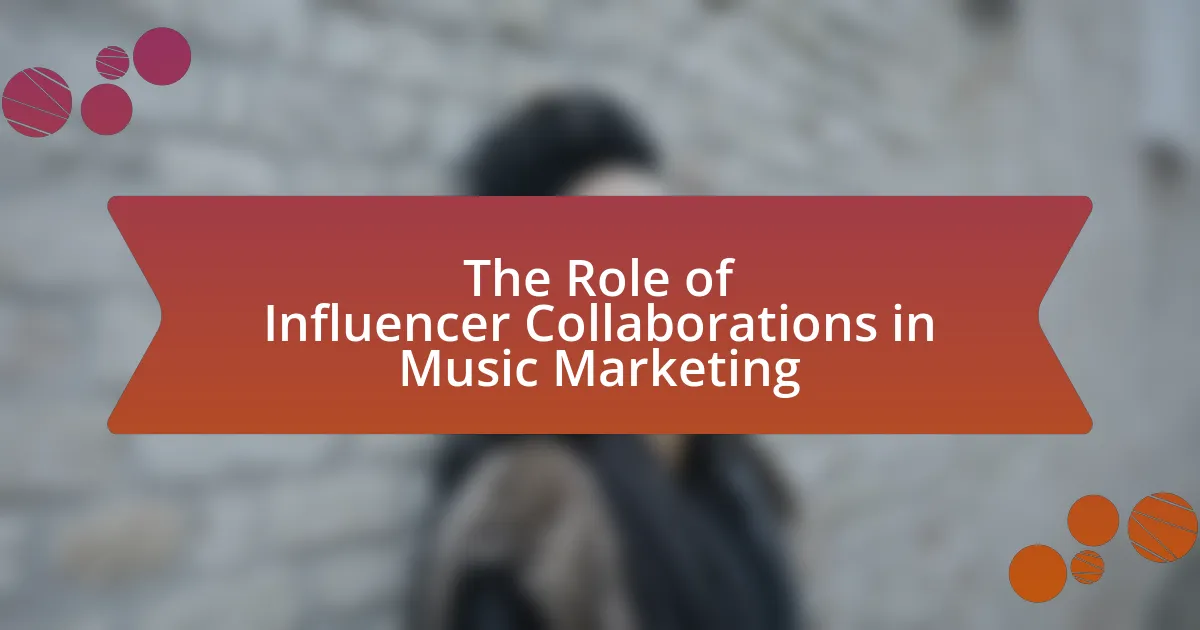The article focuses on understanding the algorithm that governs music posts on digital platforms, emphasizing the importance of engagement metrics such as likes, shares, comments, and watch time in determining organic reach. It outlines how algorithms prioritize content based on user interactions and historical performance data, influencing visibility and audience engagement. Key strategies for musicians to enhance their organic reach include optimizing posts with relevant hashtags, maintaining consistent posting schedules, and producing high-quality content that resonates with audiences. Additionally, the article addresses common misconceptions about algorithms and highlights the significance of data analysis in refining posting strategies for better engagement outcomes.
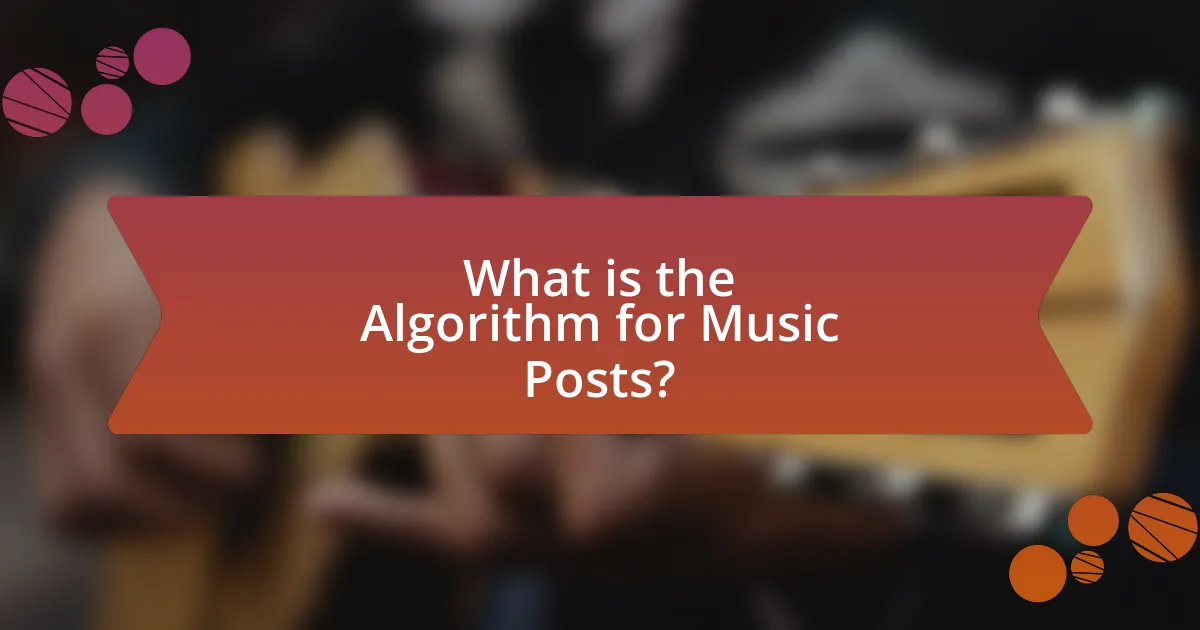
What is the Algorithm for Music Posts?
The algorithm for music posts primarily utilizes engagement metrics, such as likes, shares, comments, and watch time, to determine visibility and reach. Platforms like Spotify and Instagram analyze user interactions to prioritize content that resonates with audiences, thereby enhancing organic reach. For instance, a study by Hootsuite indicates that posts with higher engagement rates are more likely to appear in users’ feeds, demonstrating the algorithm’s reliance on active user participation to promote music content effectively.
How does the algorithm determine organic reach?
The algorithm determines organic reach by analyzing user engagement metrics such as likes, shares, comments, and the time spent on posts. These metrics indicate the relevance and quality of content to users, influencing how widely it is distributed within the platform. For instance, higher engagement rates signal to the algorithm that the content is valuable, leading to increased visibility in users’ feeds. This process is supported by data showing that posts with higher interaction rates can reach significantly more users, often resulting in a multiplier effect on organic reach.
What factors influence the algorithm’s decisions?
The factors that influence the algorithm’s decisions include user engagement metrics, content relevance, and historical performance data. User engagement metrics, such as likes, shares, and comments, signal to the algorithm which posts resonate with audiences, thereby affecting visibility. Content relevance is determined by how well the post aligns with user interests and preferences, often assessed through keywords and hashtags. Historical performance data, which tracks how similar content has performed in the past, informs the algorithm’s predictions about future engagement. These elements collectively guide the algorithm in prioritizing content that is likely to engage users effectively.
How does user engagement affect organic reach?
User engagement significantly enhances organic reach by signaling to algorithms that content is valuable and relevant. When users interact with posts through likes, shares, comments, or saves, it indicates to platforms that the content resonates with the audience. For instance, a study by Hootsuite found that posts with higher engagement rates receive greater visibility in users’ feeds, leading to increased organic reach. This correlation demonstrates that active user participation directly influences how widely content is distributed, as algorithms prioritize engaging content to maintain user interest.
Why is understanding the algorithm important for musicians?
Understanding the algorithm is crucial for musicians because it directly influences how their music is discovered and promoted on digital platforms. Algorithms determine which content is shown to users, impacting visibility and engagement. For instance, platforms like Spotify and Instagram utilize algorithms that prioritize user interaction, meaning that musicians who understand these mechanisms can tailor their content to increase organic reach. Research indicates that posts optimized for algorithmic preferences can achieve up to 50% more engagement, demonstrating the importance of algorithm comprehension in maximizing audience exposure.
How can musicians benefit from optimizing their posts?
Musicians can benefit from optimizing their posts by significantly increasing their organic reach and engagement on social media platforms. When musicians tailor their content to align with platform algorithms, they enhance visibility, leading to a larger audience and more interactions. For instance, research indicates that posts with optimized hashtags can increase engagement by up to 30%, as they become more discoverable to users interested in specific genres or themes. Additionally, consistent posting schedules and high-quality visuals can further attract followers, as platforms tend to favor active accounts in their feeds. Thus, by strategically optimizing their posts, musicians can effectively expand their fan base and improve their overall online presence.
What common misconceptions exist about the algorithm?
Common misconceptions about the algorithm include the belief that it is entirely random and that engagement metrics are the sole factor in determining visibility. In reality, algorithms are designed based on complex rules and patterns that prioritize content relevance, user behavior, and contextual factors. For instance, studies show that algorithms consider factors such as the timing of posts, the relationship between users, and the type of content being shared, rather than just engagement numbers alone. This understanding helps users strategize effectively to enhance their organic reach on music posts.
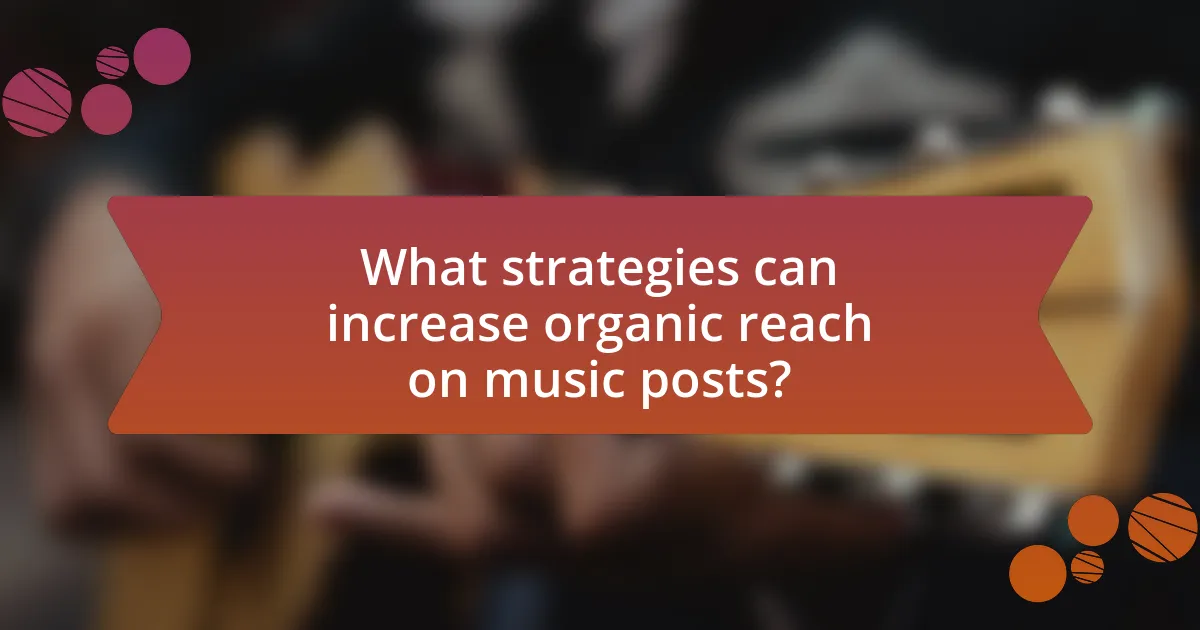
What strategies can increase organic reach on music posts?
To increase organic reach on music posts, utilize targeted hashtags, engage with followers, and post consistently. Targeted hashtags enhance discoverability by connecting posts to relevant trends and audiences, as evidenced by studies showing that posts with at least one hashtag receive 12.6% more engagement than those without. Engaging with followers through comments and direct messages fosters community and encourages sharing, which can amplify reach. Additionally, maintaining a consistent posting schedule keeps the audience engaged and improves visibility in algorithmic feeds, as platforms favor active accounts.
How can content quality impact organic reach?
Content quality significantly impacts organic reach by influencing user engagement and search engine rankings. High-quality content tends to attract more shares, likes, and comments, which signals to algorithms that the content is valuable, thereby increasing its visibility. For instance, a study by BuzzSumo found that articles with higher engagement rates receive 8.5 times more shares than those with lower engagement, demonstrating the direct correlation between content quality and organic reach. Additionally, search engines prioritize well-researched, informative, and relevant content, which can lead to higher rankings in search results, further enhancing organic reach.
What types of content resonate best with audiences?
Engaging and relatable content types resonate best with audiences, particularly storytelling, user-generated content, and visually appealing media. Storytelling captivates audiences by creating emotional connections, as evidenced by studies showing that narratives can increase engagement by up to 300%. User-generated content fosters community and trust, with 79% of consumers stating user-generated content highly impacts their purchasing decisions. Additionally, visually appealing media, such as videos and infographics, can increase information retention by 65% compared to text alone, making them highly effective in capturing audience attention.
How often should musicians post to maximize reach?
Musicians should post at least three to five times per week to maximize reach. This frequency allows for consistent engagement with the audience while keeping content fresh and relevant. Research indicates that social media algorithms favor active accounts, meaning that regular posting can enhance visibility and interaction rates. For instance, a study by HubSpot found that brands posting 16 times per month saw 3.5 times more engagement than those posting less frequently. Therefore, maintaining a posting schedule within this range can significantly improve a musician’s organic reach.
What role do hashtags play in organic reach?
Hashtags significantly enhance organic reach by categorizing content, making it discoverable to users interested in specific topics. When users search for or click on a hashtag, they are presented with a feed of related posts, increasing visibility for those posts. Research indicates that posts with at least one hashtag can increase engagement by 12.6% compared to those without hashtags, demonstrating their effectiveness in reaching a broader audience.
How can musicians effectively use hashtags?
Musicians can effectively use hashtags by selecting relevant and trending tags that align with their music genre and audience. This strategy enhances visibility and engagement on social media platforms, as posts with at least one hashtag can increase engagement by 12.6% compared to those without. Additionally, musicians should research and incorporate a mix of popular, niche, and branded hashtags to reach broader and more targeted audiences. Using tools like Hashtagify or RiteTag can help identify effective hashtags based on current trends and performance metrics.
What are the best practices for hashtag selection?
The best practices for hashtag selection include using relevant, specific, and popular hashtags that align with the content of the post. Relevant hashtags ensure that the audience interested in the specific topic can discover the post, while specific hashtags help to target niche audiences effectively. Popular hashtags can increase visibility, but they should not be overly generic, as this may lead to the post getting lost in a sea of content. Research indicates that posts with 11 or more hashtags can achieve higher engagement rates, but the optimal number varies by platform. For example, Instagram posts typically perform best with 9 to 11 hashtags, while Twitter and Facebook benefit from fewer, around 1 to 2 hashtags.
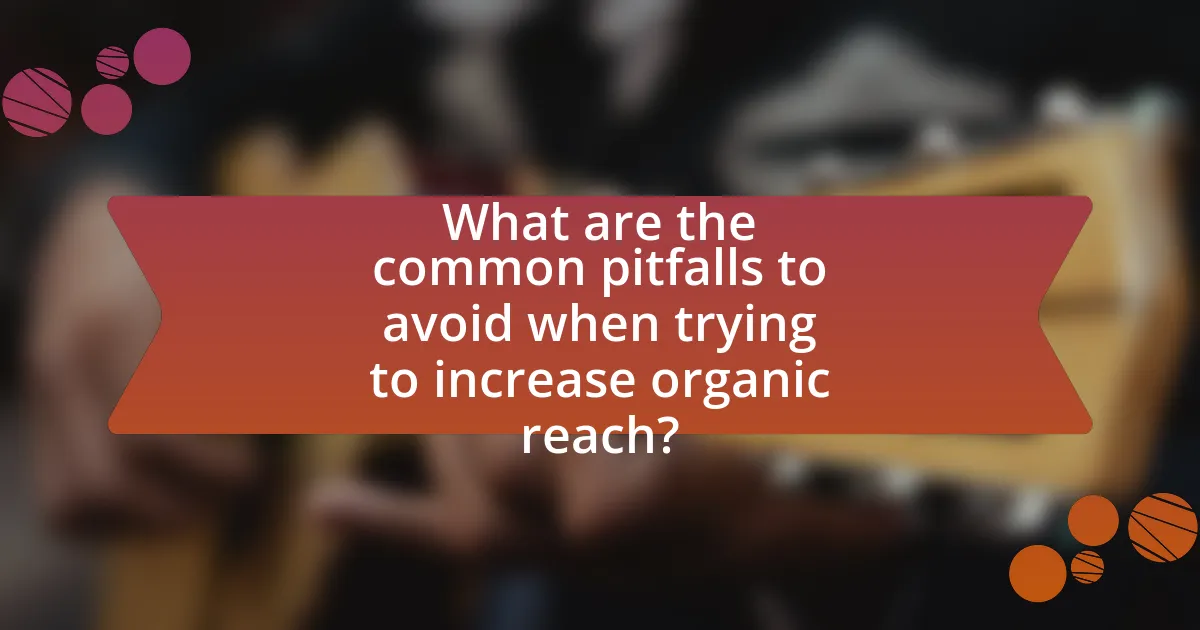
What are the common pitfalls to avoid when trying to increase organic reach?
Common pitfalls to avoid when trying to increase organic reach include neglecting audience engagement, failing to optimize content for search algorithms, and posting inconsistently. Neglecting audience engagement can lead to decreased visibility, as platforms prioritize content that generates interactions. Failing to optimize content for search algorithms, such as using relevant keywords and hashtags, can result in lower discoverability. Posting inconsistently can confuse followers and reduce overall engagement, as regular posting helps maintain audience interest and algorithm favorability.
What mistakes do musicians often make with their posts?
Musicians often make the mistake of posting content that lacks engagement and consistency. This includes infrequent posting, which can lead to decreased visibility in social media algorithms, as platforms favor active accounts. Additionally, musicians frequently fail to interact with their audience, missing opportunities to build a community and increase organic reach. Research indicates that posts with higher engagement rates, such as likes and comments, are prioritized by algorithms, making interaction crucial for visibility. Furthermore, musicians sometimes neglect to optimize their posts for specific platforms, ignoring the unique features and audience preferences of each social media site, which can hinder their overall effectiveness.
How can overposting negatively affect reach?
Overposting can negatively affect reach by causing audience fatigue and reducing engagement rates. When users are bombarded with excessive content, they may become overwhelmed and disengage, leading to lower interaction metrics such as likes, shares, and comments. Social media algorithms prioritize content that generates engagement; therefore, decreased interaction can result in reduced visibility in users’ feeds. Research indicates that posts with lower engagement are less likely to be shown to a wider audience, as platforms like Facebook and Instagram favor content that resonates with users. Thus, maintaining a balanced posting frequency is crucial for maximizing organic reach.
What are the risks of using irrelevant hashtags?
Using irrelevant hashtags can significantly harm a post’s visibility and engagement. When hashtags do not relate to the content, they can mislead users, resulting in lower interaction rates and potential audience disengagement. Additionally, social media algorithms may penalize posts with irrelevant hashtags, reducing their reach and visibility in users’ feeds. This is supported by findings from a study by HubSpot, which indicates that posts with relevant hashtags receive 12.6% more engagement than those with irrelevant ones. Therefore, the risks include decreased engagement, audience confusion, and potential algorithmic penalties.
How can musicians analyze their performance on social media?
Musicians can analyze their performance on social media by utilizing analytics tools provided by platforms like Instagram, Facebook, and Twitter, which offer insights into engagement metrics such as likes, shares, comments, and follower growth. These metrics allow musicians to assess which types of content resonate most with their audience, enabling them to refine their strategies for future posts. For instance, a study by Hootsuite found that posts with videos receive 48% more engagement than those without, highlighting the importance of content type in performance analysis. By regularly reviewing these analytics, musicians can make data-driven decisions to enhance their social media presence and increase organic reach.
What tools can help track engagement and reach?
Tools that can help track engagement and reach include Google Analytics, Hootsuite, and Sprout Social. Google Analytics provides detailed insights into website traffic and user behavior, allowing users to measure engagement metrics such as session duration and bounce rate. Hootsuite offers social media management features that include analytics for tracking post performance and audience engagement across multiple platforms. Sprout Social delivers comprehensive reporting tools that analyze social media interactions, helping users understand their reach and engagement levels. These tools are widely recognized in the industry for their effectiveness in measuring and optimizing engagement and reach.
How can data analysis inform future posting strategies?
Data analysis can inform future posting strategies by identifying optimal posting times, content types, and audience engagement patterns. By examining metrics such as engagement rates, reach, and audience demographics, creators can tailor their content to align with what resonates most with their audience. For instance, a study by HubSpot found that posts made on Wednesdays at 11 AM receive the highest engagement, indicating that timing is crucial. Additionally, analyzing past performance can reveal which genres or themes generate the most interaction, allowing for more targeted content creation. This data-driven approach enhances the likelihood of increasing organic reach on music posts by ensuring that content is both timely and relevant to the audience’s preferences.
What practical tips can musicians implement to enhance their organic reach?
Musicians can enhance their organic reach by consistently engaging with their audience through authentic interactions and quality content. Regularly posting original music, behind-the-scenes content, and personal stories fosters a deeper connection with fans, which can lead to increased shares and visibility. Additionally, utilizing relevant hashtags and collaborating with other artists can expand their reach to new audiences. Research indicates that posts with high engagement rates are favored by algorithms, leading to greater organic visibility. For instance, a study by Hootsuite found that posts with at least one hashtag receive 12.6% more engagement than those without.
